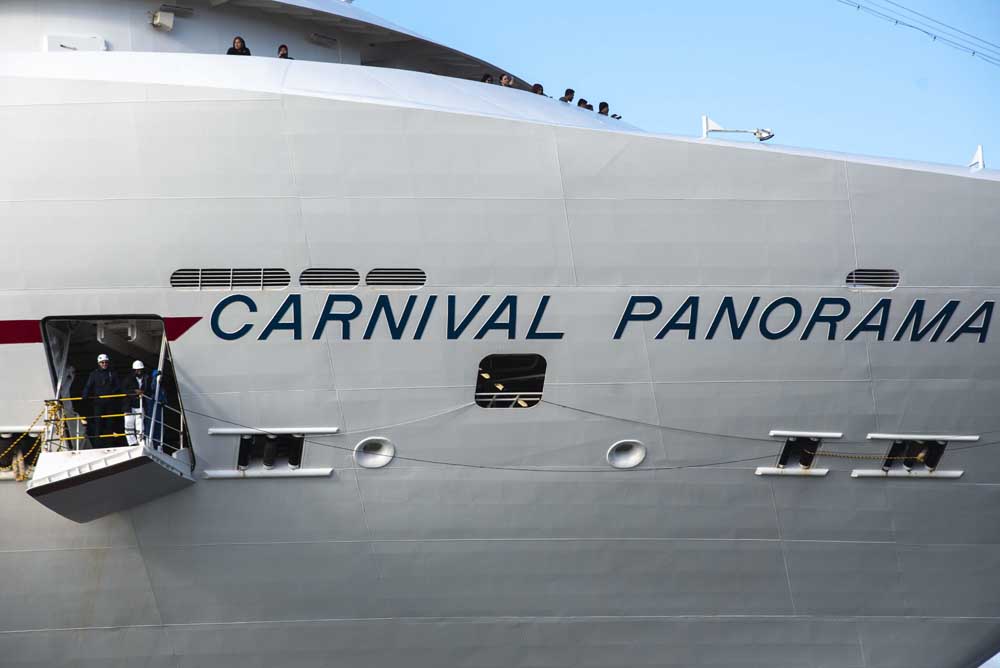Port of Astoria pushes back after customs delays led to cruise ship cancellations
Published 9:45 am Friday, September 27, 2024

- The Carnival Panorama docked in Astoria in November on its way to a shipyard for repairs.
The Port of Astoria is pleading with U.S. Customs and Border Protection to ease the clearing process for cruise ship passengers after Princess Cruises canceled four ships scheduled for this fall amid concerns about waiting times.
Trending
When cruise ship passengers arrive in Astoria from a foreign port — typically in Canada — it is standard for them to spend two or three hours waiting to go through customs screening. But last year, Customs and Border Protection began to implement changes to the process, introducing advanced biometric screening methods that the Astoria customs office’s equipment was not able to handle.
As a result, waiting times went from two or three hours to sometimes five or six for the largest ships, Will Isom, the executive director of the Port of Astoria, said. Astoria does not host cruise ships overnight, so passengers who spent several hours waiting to be cleared were barely able to get off the boat, missing tours and other planned excursions in town.
Due to these delays, Princess Cruises, which is owned by Carnival Corp., has diverted four cruise ships that were scheduled to stop in Astoria this fall. According to Melanie Howard, the Port’s finance director, each of these larger ships brings in more than $47,000 in revenue for the Port, which typically hosts a few dozen oceangoing ships at Pier 1 each year. The four canceled ships result in a loss in revenue of approximately $190,000.
Trending
The Port is pulling out all the stops to pressure Customs and Border Protection to find a solution. The Port has refused to enroll in the federal agency’s reimbursable services program, which would entail purchasing new equipment for the Astoria customs office, costing upward of $100,000 for technology that the Port would not have ownership of. In addition, the reimbursable services program would require the Astoria office to bring in additional personnel from Portland or Vancouver, Washington, also at the Port’s expense.
‘Unfunded mandate’
Isom views the program as requiring the Port to essentially subsidize a federal agency, and believes it should be the responsibility of Customs and Border Protection to supply its own updated equipment and the labor necessary.
“The main hope would be that Customs properly budgets for, whether it’s equipment or staffing that it takes for them to do their jobs here in Astoria,” he told The Astorian. “And that’s been really the rub here, is that because of a shortfall in their budgeting and sort of an unfunded mandate in terms of security requirements that then, you know, for that cost to get passed on to the Port of Astoria, to me, is not right.”
The Port provides infrastructure and dockage for cruise ships and coordinates with local partners to help passengers during visits, but typically stays out of issues like customs screening.
But now, the disruptions have forced the Port to take a more active role. In August, the Port Commission voted to authorize Isom to send a letter to Customs and Border Protection on the Port’s behalf, a letter that several other local leaders have since signed on to.
“While the Port understands the importance of passenger screening, CBP’s request to enroll in the (reimbursable services program) is unacceptable, as it provides no guaranteed improvement,” the letter states. “Similarly, if CBP is to improve processing times to acceptable levels, an alternative solution with guaranteed results must be crafted. The Port of Astoria is willing to assist in these endeavors, but it is not willing to subsidize a federal agency.”
The Astorian reached out to a representative for Customs and Border Protection but did not immediately receive a comment.
The Port is also enlisting the help of regional and national partners to increase the pressure. An ad hoc committee led by Robert Stevens, the chair of the Port Commission, and former state Sen. Betsy Johnson convened earlier this month to discuss the problem. The Port has been in frequent contact with the office of U.S. Rep. Suzanne Bonamici, an Oregon Democrat who represents the North Coast.
“When I was in Astoria recently I heard from staff at the Port that a CBP policy change designed to strengthen identity verification at border crossings was having unintended consequences for the Port of Astoria and the regional economy,” Bonamici said in a statement. “I met with CBP leadership to explain the Port’s concerns. I am hopeful that we will be able to resolve the issue by working together.”
So far, the cruise ships that have canceled this fall are all from Princess Cruises — but the Port fears that more cruise lines will cancel in future seasons if the problem is not resolved.
“I’m demonstrating with Princess that we’re going to fix this, working together with CBP,” Bruce Conner, the Port’s director of cruise industry marketing, said at a Port Commission meeting in August. “I mean, this is urgent, so I don’t want this to get into the industry that Astoria’s having delays, because we have other cruise companies that could do the very same thing.”
A representative for Princess Cruises did not respond to multiple requests for comment by The Astorian.
‘Real boon’
Cruise ships bring revenue not just to the Port, but to the community, according to David Reid, the executive director of the Astoria-Warrenton Area Chamber of Commerce, who participated in the ad hoc committee meeting earlier this month.
“The cruise ships have been a real boon to our community, starting with just the fact that it supports the Port … There’s also the commerce that happens, mostly in Astoria, but actually throughout the county, with tours and with people coming off the boat and making purchases,” Reid said. “And those are — we lose those when we lose one of these cruise ships. And on a good day, these cruise ships are bringing in 3,000 to 3,500 people. So it’s a loss.”
Port leaders have emphasized that the problem is largely unique to the Port of Astoria: enrolling in the reimbursable services program poses less of a financial burden for larger ports, which are typically those more likely to host ships coming from foreign ports.
“There are other ports that have spent this type of money,” Matt McGrath, the Port’s deputy director, said at the August Port Commission meeting. “These are Port of Seattle, Port of San Diego, that have hundreds of cruise calls every year. And so when you look at the line item of our budgets versus theirs, the percentage of what the revenue means is vastly different when you’re comparing ports like the Port of Astoria to Seattle and San Diego.”
Despite being largely alone among ports in this struggle, Isom is optimistic that the Port’s community and legislative connections will put enough pressure on Customs and Border Protection to come up with a solution.
“Our efforts here locally have definitely had an impact,” he said at the September Port Commission meeting. “The fact that we have so much support from different groups, different entities and individuals, I think, had an impact. And so the fact that we were able to get that information out, get that back to CBP, and along with that, have a legislative push, I think, is going to have an impact.”









